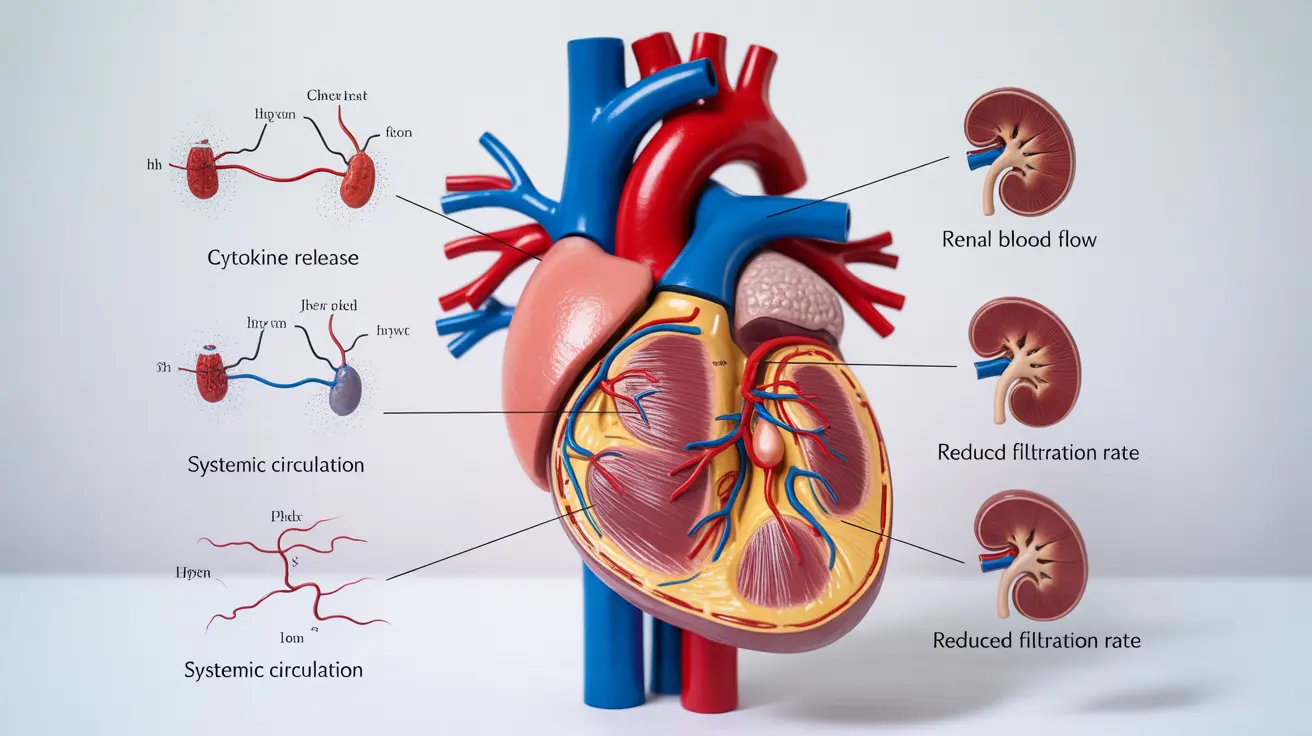When patients undergo heart surgery, their kidneys face significant challenges that can sometimes lead to acute kidney injury or failure. This serious complication affects approximately 20-30% of patients following cardiac surgery, making it crucial to understand why kidneys fail after heart surgery and how to manage this risk.
The relationship between heart surgery and kidney function is complex, involving multiple factors that can impact kidney health during and after the procedure. Understanding these connections can help patients and healthcare providers better prepare for and potentially prevent post-surgical kidney complications.
How Heart Surgery Affects Kidney Function
During heart surgery, several mechanisms can impact kidney function and potentially lead to kidney failure:
- Changes in blood flow and pressure
- Inflammatory responses
- Exposure to medications and contrast dyes
- Stress on the body's systems
The use of cardiopulmonary bypass (heart-lung machine) during surgery can particularly affect kidney function by altering normal blood flow patterns and triggering inflammatory responses throughout the body.
Common Causes of Post-Cardiac Surgery Kidney Failure
Several specific factors contribute to kidney failure following heart surgery:
Reduced Blood Flow
During surgery, blood flow to the kidneys may be temporarily reduced, especially when using a heart-lung machine. This reduction in blood flow can cause damage to kidney tissue, potentially leading to acute kidney injury.
Inflammatory Response
The body's natural inflammatory response to surgery can affect kidney function. This inflammation can damage kidney tissue and impair normal filtration processes.
Medication Effects
Various medications used during and after surgery may impact kidney function:
- Anesthesia medications
- Blood pressure medications
- Antibiotics
- Pain medications
Risk Factors for Kidney Failure After Heart Surgery
Certain conditions and characteristics can increase the risk of developing kidney problems after cardiac surgery:
- Pre-existing kidney disease
- Diabetes
- High blood pressure
- Advanced age
- Obesity
- Complex or emergency cardiac procedures
- Extended time on cardiopulmonary bypass
Signs and Symptoms of Post-Surgical Kidney Problems
Healthcare providers monitor several indicators of kidney function after heart surgery:
- Decreased urine output
- Swelling in legs and feet
- Confusion or mental changes
- Chest pain or pressure
- Shortness of breath
- Abnormal blood test results
Prevention and Management Strategies
Several approaches can help reduce the risk of kidney failure after heart surgery:
- Careful pre-surgical evaluation of kidney function
- Optimal medication management
- Maintaining adequate blood pressure during surgery
- Minimizing time on cardiopulmonary bypass when possible
- Close monitoring of fluid balance
- Early detection and treatment of complications
Frequently Asked Questions
Why do kidneys often fail after heart surgery and what are the main causes? Kidneys can fail after heart surgery due to reduced blood flow, inflammatory responses, and the effects of medications. The use of cardiopulmonary bypass and the overall stress of surgery on the body are major contributing factors.
What risk factors increase the chance of kidney failure following cardiac surgery? Key risk factors include pre-existing kidney disease, diabetes, high blood pressure, advanced age, obesity, complex surgical procedures, and extended time on cardiopulmonary bypass.
How does the use of a heart-lung machine affect kidney function during heart surgery? The heart-lung machine can affect kidney function by altering normal blood flow patterns, potentially triggering inflammatory responses, and changing blood pressure dynamics, which can all impact kidney health.
What symptoms and signs indicate kidney injury after heart surgery? Common signs include decreased urine output, swelling in the extremities, confusion, chest pain, shortness of breath, and abnormal kidney function tests.
What treatments or preventive measures can reduce the risk of kidney failure post-heart surgery? Preventive measures include careful pre-surgical evaluation, optimal medication management, maintaining proper blood pressure during surgery, minimizing time on cardiopulmonary bypass, and close monitoring of fluid balance.




